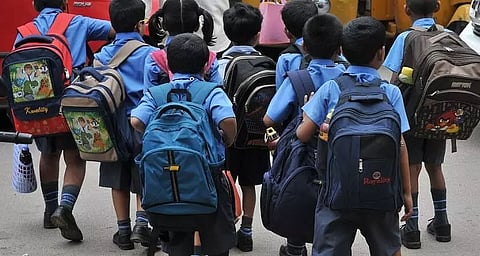
- Home
- Live Blog
- Breaking News
- Top Headlines
- Cities
- NE News
- Sentinel Media
- Sports
- Education
- Jobs

The Assam Non-Government Educational Institutions (Regulation of Fees) Rules, 2020 approved by the State Cabinet that seeks to regulate the fee structure of the private schools and junior colleges is expected to provide relief to the parents and guardians against arbitrary hike in tuition and other fees. Under the new rules, the State government is required to set up a Fee Regulatory Committee for determination of fee for any standard or course of study run by private educational institutions. Implementation of these Rules will need more clarity on the powers and function of the committee if and when the Assam Government decides to set up the State School Standards Authority (SSSA) as envisaged in the National Education Policy (NEP), 2020. The Union Cabinet on July 29 approved the NEP, 2020 - the country's first education policy of the 21st century that replaces the old National Policy on Education, 1986. The Assam Non-Government Educational Institutions (Regulation of Fees) Act, 2018, as amended in 2020, empowers the Fee Regulatory Committee to determine the fee on different factors like the location of the school, investment incurred to set up the school, expenditure on administration, maintenance of services and utilities, strength of students, classes of study and course offered, infrastructure made available to students for quality of education as mentioned in the prospectus or website, qualification of teaching staff and expenditure incurred on students against total income that includes profit earned. The NEP, 2020, on the other hand, prescribes setting up of an independent statewide body for "effective quality self-regulation or accreditation system" for all stages of education including pre-school education - private, public, and philanthropic - to ensure compliance with essential quality standards. "To ensure that all schools follow certain minimal professional and quality standards, States/UTs will set up an independent, statewide, body called the State School Standards Authority (SSSA). The SSSA will establish a minimal set of standards based on basic parameters (namely, safety, security, basic infrastructure, number of teachers across subjects and grades, financial probity, and sound processes of governance)," the policy adds. It is not clear if the SSSA will make the Fee Regulatory Committee redundant. Education was transferred as a subject to the concurrent list from the State List following the 42nd Constitutional amendment in 1976. However, NEP is a policy and not a law and therefore Centre and the states will have to frame regulations for its implementation. The powers and functions of the Fee Regulatory Committee is backed by an act passed by the Assam Assembly. The SSSA will have powers and function overriding the committee only if it is backed by an act passed by the parliament or the State Assembly. State Education Minister Himanta Biswa Sarma welcomed the NEP, 2020 as a "historic move by the Union Cabinet" and also announced constitution of a 40-member committee to study the new national policy and give its recommendations by December 31. The State Government is yet to clarify if it will wait for the recommendation of the committee on NEP, 2020 or start implementing the Assam Non-Government Educational Institutions (Regulation of Fees) Rules 2020 to facilitate the Fee Regulatory Committee to exercise its powers to determine the fees of private educational institutions. The amendment made in 2020 to the principal Act of 2018 defines "non-government educational institutions" to be "schools established and run by an individual or association of individuals or any Non-Government Organization or Society or Trust imparting education in any two or more classes from pre-primary to class XII including colleges imparting education in class XI and XII except educational institutions run by Central or State Government including provincialized schools or colleges and the schools or colleges, as the case may be, established and maintained by minorities under clause (1) of Article 30 of the Constitution of India, provided that they are registered with the appropriate authority". The primary challenge before the Fee Regulatory committee will be to distinguish the public spirited/philanthropic private educational institutions from for-profit private educational institutions while determining the fee structures. The NEP, 2020 sounds a word of caution that "the current regulatory regime also has not been able to curb the commercialization and economic exploitation of parents by many for-profit private schools, yet at the same time it has all too often inadvertently discouraged public-spirited private/philanthropic schools." The new national policy calls for assessing and accrediting pubic and private schools on the same criteria, benchmarks and process, emphasizing online and offline public disclosure and transparency "so as to ensure that public-spirited private schools are encouraged and not stifled in any way." Categorization of the non-government educational institutions in the state into three categories of public-spirited, philanthropic, and for-profit schools as envisaged in the NEP, 2020 has become necessary so that quality of education and public interest get more weightage than the optics.